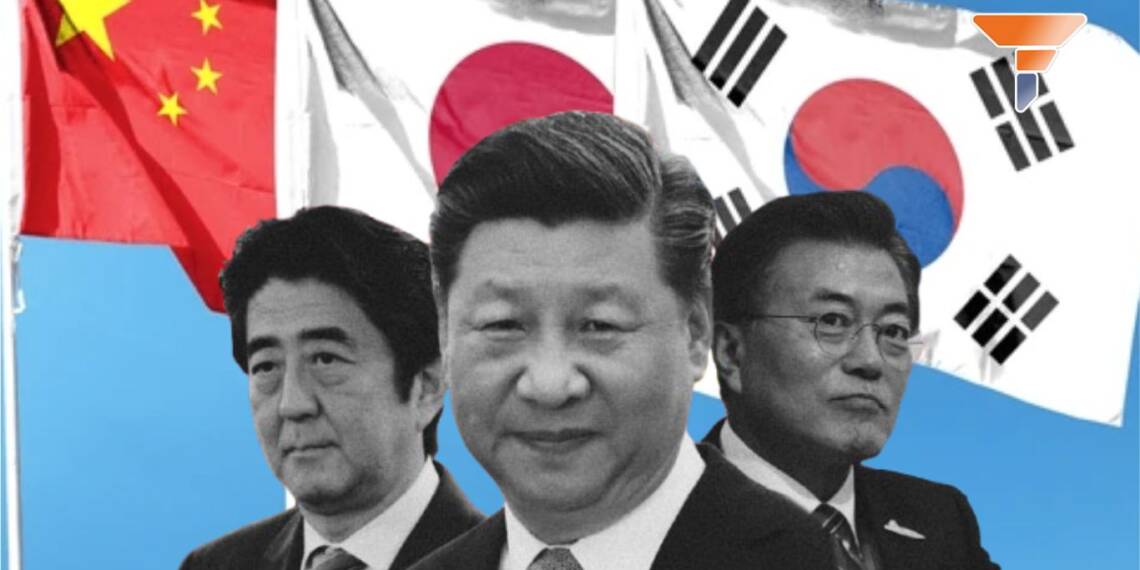China, Japan and South Korea have agreed to jointly respond to Trump tariffs following an economic dialogue between the nations for the first time in five years. The three countries seek to facilitate regional trade as they seek to counterbalance the effects of US President Donald Trump’s tariffs.
China has already retaliated to the Trump tariffs by announcing it will impose reciprocal tariffs on all imports from the US from April 10. While Japanese Prime Minister Shigeru Ishiba on Friday said that the Trump’s tariffs constitute a “national crisis,” and announced plans for cross-party discussions to address the situation.
Meanwhile the Chinese state media confirmed that the three countries held their first economic dialogue in five years on Sunday, seeking to facilitate regional trade as the Asian export powers brace against US President Donald Trump’s tariffs.
Japan and South Korea are seeking to import semiconductor raw materials from China, and China is also interested in purchasing chip products from Japan and South Korea, the account, Yuyuan Tantian, linked to China Central Television, said in a post on Weibo.
All three sides agreed to strengthen supply chain cooperation and engage in more dialogue on export controls, the post said.
“The three countries exchanged views on the global trade environment, and as you can see in the joint statement, they shared their understanding of the need to continue economic and trade cooperation,” the South Korean trade ministry spokesperson said.
During Sunday’s meeting, the countries’ trade ministers agreed to speed up talks on a South Korea-Japan-China free trade agreement deal to promote “regional and global trade”, according to a statement released after the meeting.
The countries’ trade ministers met ahead of Trump’s “liberation day” tariffs, as he upends Washington’s trading partnerships.
Also Read: ‘Liberation day’ is here: Trump unleashes Tariff war on the world
The US President Donald Trump has launched a sweeping tariff regime, imposing 10 percent levies on all imports and significantly higher tariffs on key trading partners. This move, termed ‘Liberation Day’ by Trump, aims to address what his administration perceives as longstanding trade imbalances, particularly targeting the so-called ‘Dirty 15’ nations, which include China, India, Canada, Mexico, Japan, and Germany. China faces the harshest blow with a 34 percent tariff, while India has been slapped with 26 percent. Japan, Taiwan, and South Korea also face hefty levies of 24 to 32 percent.
Trump also imposed a 25 per cent tariff on imported automobiles, affecting major Japanese automakers like Toyota, Nissan, and Honda. The tariff is particularly impactful for Japan, where automobiles make up 28.3 per cent of the nation’s exports to the US, a critical component of Japan’s economy. Japanese Prime Minister Shigeru Ishiba had earlier stated that the country will “put all options on the table” in considering the most effective response to the tariffs.
Beijing, Seoul, and Tokyo are major US trading partners, although they have been at loggerheads amongst themselves over issues such as territorial disputes and Japan’s release of wastewater from the wrecked Fukushima nuclear power plant.
Japan and South Korea are seeking to find balance in their foreign policy in the shadow of China’s rise, aiming for equality and autonomy within the Japan-US-South Korea alliance while seeking to improve China-Japan-South Korea relations without weakening their stance against Beijing. The situation in the Korean Peninsula is no different; North Korea’s aggressive posture and the US tariffs must have pushed South Koreans to think of a balanced way out as they have good relations with the US and relations with China can improve for future years.
There is convergence in the interests of trade, and a common problem now emerges in front of them in the form of the Trump tariffs.
The response to Donald Trump’s sweeping tariffs provides an incentive to reboot China-Japan-South Korea ties that have been in a conditioned limbo for the past few decades. Now, the trio have a chance to reorganize and discuss regional partnerships that can boost the economies of all three nations and take the region to new geostrategic heights.








